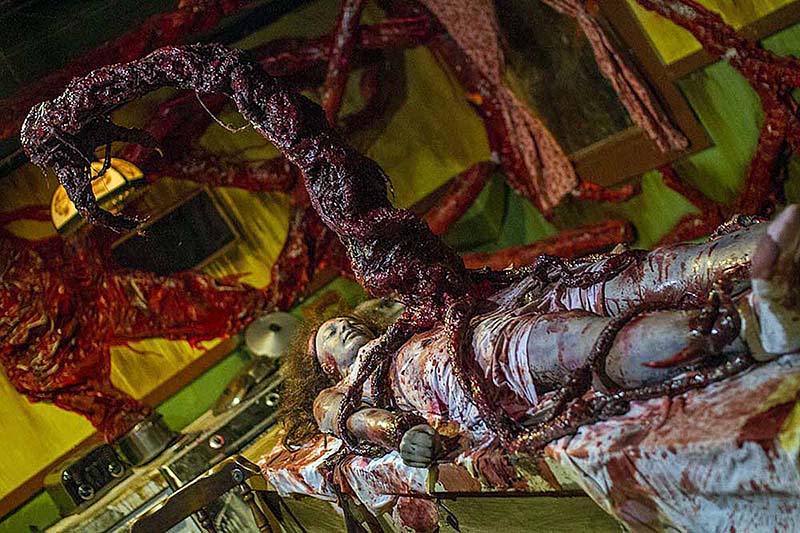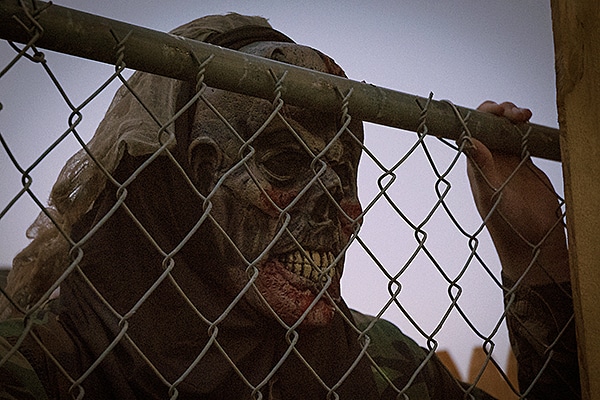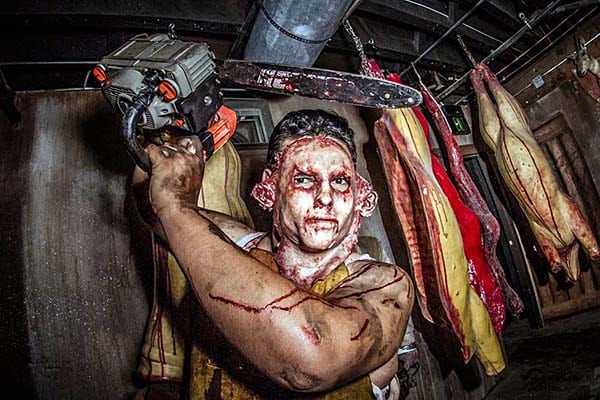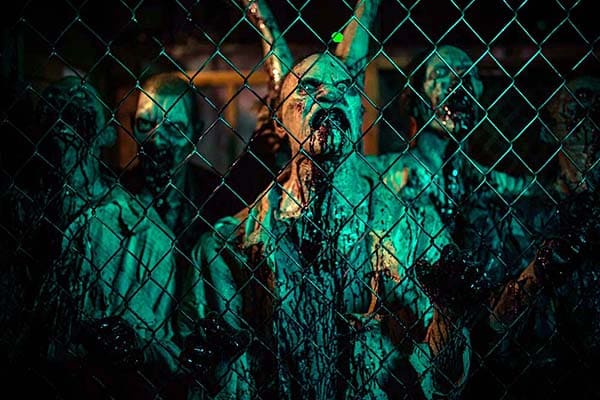How to View Criticism as a Gift That Can Help You Make Your Haunt the Best Ever
Here we are with another blog, this one based on Episode 5 of A Scott in the Dark. The topic of this blog is one I’ve wanted to talk about for a while, so I’m really glad one of my listeners suggested it.
As you noticed, this blog is called “You Suck,” and I’m going to talk about how to deal with criticism, both positive and negative, and competition within the haunt industry. Lots of people think we’re all out to get each other, and that just doesn’t make sense to me. I’m going to share my opinion on this with you, which is basically just the opposite of that.
Criticism is a Gift
When we work hard on something like a haunted attraction, we become emotionally invested in it. Whenever anybody says something positive or negative about it, we take it very much to heart. So, let’s begin with people saying good things about your haunt. We’ve all had successes out there. When people say, “You’re wonderful,” or, “You’re the best this or the best that,” that’s wonderfully powerful for your marketing campaigns—your Facebook page, your billboards, your advertising. But don’t get too locked into that, because there’s going to be someone just around the next corner who’s going to say, “You suck.” We need to take compliments with a grain of salt. I like to think of compliments as a head nod during a conversation. If someone is nodding in agreement, it’s like they’re saying, “keep going, yeah, that’s good, keep doing that.”
In my opinion, criticism is a gift. That may seem weird, because it stings when you’ve worked on something and somebody absolutely hates it, doesn’t get it, or just thinks you’re a complete loser. Believe me, there have been many, many people in my career who’ve said, “You don’t know what the hell you’re talking about.” The nice thing is, there have also been quite a few people who’ve said, “Scott knows what he’s talking about, so listen to him.” Whether you agree with me or not, at least I have a point of view. If you don’t agree with me, I think that’s a good thing, because I’m a firm believer that, for something to be truly great, someone, somewhere, has to hate it.
If everybody thinks you are at 100% capacity and everybody loves you, that means you’ve hit mediocrity square in the bullseye. It may make somewhat good business sense in that you feel safe. Nobody is ever going to say Walmart is the best department store in the world, but it’s clearly safe. Everybody can shop there, feel comfortable, and feel like they’re getting a good deal. But no one is going to say that Walmart is the best place in the whole world to shop for everything.
The haunt industry is all about scaring people, and that means we’re an emotion-based market. There are people who are going to be scared by one thing you do and other people who aren’t going to be scared of that same thing. Some people are afraid of the dark, some people are afraid of snakes, some people are afraid of clowns, some people are afraid of doctors, and some people are afraid of monsters and aliens. There’s always going to be someone who says, “That’s not scary,” or, “It’s not scary enough.” There are a number of different things you can do with that criticism, and I’ll go into more detail about that shortly.
Basically, any criticism is someone else’s perception of what you’ve done. Whether you’re a home haunter, an independent haunter, or a theme park haunter, you’ve been working your butt off and spending way too many hours and investing way too much of your time in making your haunt good. Then somebody comes by and glibly throws some sort of jab at it and says they don’t like it. Your first response will likely be to get angry, but if you recognize that their opinion is a gift, it makes it much easier to deal with.
As with any gift, you should always accept the gift of criticism graciously and say thank you. You can say, “Thank you for sharing your opinion,” and even, “I’ve never looked at it that way” or “That wasn’t my intention, but I appreciate you sharing your point of view.” Then, as with any other gift, you can use it to make changes. Or, you could decide, “This gift really isn’t for me.” You can consider what was said and determine if it’s true and has value for where you want to go with your haunt.

Three Steps for Processing Criticism
This leads me to something I learned when I was in college. I had a phenomenal acting teacher. His name is Jim Hasselhoff, and he was my teacher at the Goodman School in Chicago. One of the things that Jim taught us is how to take criticism. He said there are three basic steps to taking any form of criticism or critique. Of course, acting and theater students are all way too emotional. We’re so emotional that it’s exhausting at times. His three-part approach to taking criticism and critique is something I’ve kept to this very day.
The first step is to open yourself up like a dart board. Allow anybody or anything to throw whatever comments, negativity, or positivity at you. Be open to it, let it all come in, don’t argue with it, don’t fight it as it’s coming in, smile and nod, and accept it all. That’s challenging at times, especially if you aren’t 100% confident about what you did to begin with. That’s usually when people respond negatively—they realize the critic might just be right, and that hurts even more. Recognize this is someone’s opinion and that you’ll have the opportunity later to address it accordingly.
The second step of the process is to review and enact. Pluck those little darts off and find out what each one of them is. Was one of the criticisms that your haunt was too short? You can look at that and say, “I’ve got a limited amount of space.” You might want to then consider if you’re using the space to its fullest advantage. Then, look at this in conjunction with other critiques. For example, three other people might have said your haunt was too long. If so, that means it’s probably about right, and those conflicting critiques cancel each other out. If you can get more information about these criticisms, that’s even better.
As a side note regarding the length of haunts, I believe that the length of a haunted experience ties directly to the length of the queue. If you have to wait for two hours for a 15-minute haunt experience, it better be the most incredible 15 minutes anybody has ever had. However, if you wait 10 minutes for the same 15-minute experience, it’s going to be absolutely amazing. So, ramp up your throughput, your queueing experience, or make the queue part of the experience. This is a whole ‘nother discussion. In a nutshell, if you can keep the wait shorter, it makes the experience seem longer and more worth it.
The third step is to look at where the criticism or comment is coming from. If the commenter is used to visiting theme-park haunts, it’s natural they might think yours is too short. Once you review all the comments—all the little darts that have come into your own personal dartboard—you can figure out which ones are good ideas that you can actually enact. If someone says, “You don’t have enough virtual reality in your haunt,” that could likely be because of cost or what you’re trying to do. Personally, I haven’t found a virtual-reality experience that works for me. I haven’t seen them all, so there’s probably one out there that I’d find truly amazing, but it’s just not what I want to pursue in my haunt experience or my escape room experience or anything else like that. I think virtual reality takes us back into the computer, which is where atmospheric theater started in the first place.

Assess What Criticism is Valid and What Isn’t
I’m 6’4”, so, if somebody at an acting audition says I’m too tall, there’s nothing I can do about that, and it’s not a criticism I should consider. When you’re reviewing comments and deciding what you can enact, look at the content of the criticism, not the way it’s packaged. If someone says, “You’re dumb as hell because you had only one zombie in your zombie room instead of 15,” leave out the “you’re dumb as hell” part and look at the content. Could you have had more zombies in that room, or was there a way you could make it look like you had more zombies in that room? Ignore the insults and look at the content. The same is true with positive criticism. If you’ve got people blowing smoke, that’s great for a fog machine. If your guests or friends say, “It was really wonderful,” ask them to be specific about what they liked about it.
Review and enact those things that make sense and you’re able to do. After you’ve done that, forget all the critiques. Let them go. If you stay so focused on what guests say rather than on what you want to do, your storyline is going to get so disjointed, watered down, or messed up. There’s an old adage that says a camel is a horse put together by a committee. That applies here. Your haunt will become a camel instead of a horse if you pay too much attention to input. All you’re doing is being reactionary to that input. You need to listen to it and enact it up to a certain point, but if your entire creative design and structure is based on one comment after another after another, you really have no vision of your own. So, use the criticism as a tool—as a means, not as an end.
Listen to Guests as They Exit Your Haunt
When I was working at Howl-O-Scream, we had a simple way of dealing with guest comments. I spent a lot of time out in the park looming over guests’ shoulders and eavesdropping on their conversations. That sounds creepier than it actually was. I spent a lot of time standing at the exit of a haunted house and listening to what the guests were talking about as they left. That’s what you want to pay attention to. If you hear several people say, “It was a great house, except that last scare was lame,” chances are good there’s an opportunity for improvement there. Listening to people at the haunt talking to each other is more impactful than what they post online or say in a survey.
Our model at Howl-O-Scream was based on three things: start, stop, continue. Start doing things that you’re not doing that you should be doing, stop doing things you’re doing and shouldn’t be, and continue doing things that are working and build off them. Make it a, “Yes, and?” scenario: “Yes, that works, and if we do this, it will impact even more people.”
Those are the three steps of how to take criticism and the three ways of making your haunt even better.

Survey Your Guests, and Respond to Criticism
If you don’t have an exit survey for your guests, you should do that. You have to have a thick skin to read these, so you don’t want somebody doing that who gets ticked off when a guest writes, “It was dumb. I wasn’t scared enough.” Surveys are important, because most haunt owners don’t have the opportunity to stand around at the exit of a haunt—they’re making sure the circuit breakers haven’t thrown, all their actors are in place, etc., etc. You can do a survey online with Survey Monkey, or you can do a written survey and have the guest either send it in, scan it, or leave it with you. Don’t discourage people from sharing their opinion with you, because it’s only going to make your haunt better if you use their input appropriately.
If somebody posts criticism in a public forum like Yelp, Facebook, other social media, on your website, or on somebody else’s website, there are a couple of things you definitely need to do. First and foremost, it’s okay to address their criticism. It’s okay to say, “I’m really sorry you had that experience.” Don’t become argumentative. That serves absolutely no purpose. I’m saying this because I’ve made that mistake in the past. I was so close to the material and I’d heard so many people who loved it, so when one person said they hated it, the first thing out of my mouth was, “Everybody else likes it.” That kind of statement only pushes that person further away from you. They’ll be less of a loyal patron. If you respond with, “I appreciate what you have to share. Thank you so much for sharing your opinion,” that allows you to take a negative and turn it into a positive. It also might give them an opportunity to explain what they didn’t like. Maybe they were angry because they had to park too far from your haunt, or maybe they were angry because it was really hot that night and they were wearing a jacket and it made them uncomfortable.
Creature comfort, by the way, is a very important thing to keep in mind when you’re running any sort of attraction for guests. If you’re in a southern climate or it’s summertime, I strongly recommend you keep your guests as cool as possible, because hot guests get angry and cool guests get scared. That’s been my experience. If they’re chilly, they’re much more on edge and more likely to experience fear. Keep that in mind.
So, address online criticism, because it shows not only the person who gave you the critique but everybody else who’s reading it that you, as a business owner, care. Everybody wants to feel as though they have part ownership. There are folks out there who are fans of the haunt industry. Some people use the terms “fanboys” and “fangirls,” and they make it sound almost like something negative. The truth of the matter is, it’s not at all negative. It’s very positive. I like to think of fanboys and fangirls as the folks who are the next level of haunters. So, listen to your fanboys, listen to your fangirls, and show them you care. If they feel they have some sort of input into what you’re doing, they’ll be far more likely to help promote your haunt.
Now, of course, when you address other people’s critiques and comments, it helps you learn. For example, you could respond with, “I understand you feel the attraction was too short. What parts would you like to see expanded upon?” That input will help you make the experience better for everybody, and it turns a negative experience into a positive one.
I had a situation with one of my haunts in which a guest came up to me and basically read me the riot act. They knew who I was, they knew I was affiliated with this particular haunted attraction, and they said, “This was so lame. I’m an expert. I’ve done this, and I’ve been to that.” I just sat there and listened to them until they were finished, and then I said, “I really appreciate you sharing your experience with me, because obviously, you do know what you’re talking about. You’ve been to a lot of similar kinds of experiences, and your feedback is valuable to me. Now, without sounding defensive, here’s a couple of things you didn’t see that, had you experienced them, might have changed your opinion.” I then talked about a couple of things this person had clearly missed or not paid attention to. As we talked, they kept saying, “That’s part of it? That’s there? Oh, I missed that.” I told them where it was, and they realized they were talking to their friend during that part. The more we talked, the more I was able, first of all, to understand what their perception was and where they were coming from, and they got a better understanding of how I put things together and how I felt about it. What’s interesting is, even after giving me a really hard time, they went to their Facebook page, website, blog, and podcast and gave the event a very positive review. Now, they did mention that we’d talked, and they did mention there were certain things they found that were somehow lackluster or needed more attention, but they went on to say, “Make sure you keep your eyes open for this.”

Guests Want to Know They’ve Been Heard
So, I basically took someone who was trying to rake me over the coals, someone who wanted to challenge me and say, “I know more than you do”—which they probably did—and turned it into a situation where we became friends. Their thoughts were heard and incorporated. If someone has a gripe or a concern, the thing they want first and foremost is to be heard. They want to able to speak their piece and know that someone high up in the organization has actually heard it.
Here’s a good example. When I was working in a theme park, one of the park presidents used to carry huge stacks of his own business card in his pocket anytime he went into the park. Whenever a guest had an issue, he’d give them his business card, which had his cellphone number on it, and he’d say, “If you ever have another problem, call me and let me know what it is.” I saw him do that, and somebody else who was with me saw him do that, and they said, “You’re giving these front-line guests direct access to you as the president of a major theme park? Aren’t you inundated with calls all the time?” He just shook his head and said, “No. I get a few, but, for the most part, if people feel as though they can call me with a problem, they don’t. It’s the people who don’t feel there’s anybody who wants to hear what they have to say that are far more of a challenge. By me giving them my business card, they feel like they’re an insider and have a vested interest in the park, because they know me, the park president. And all it cost me is a business card.” I thought that was really, really smart.
If you have guests who have legitimate concerns, hear them out. If you’re face to face with them, take the time to listen. Nothing is more important—unless, of course, your haunt happens to be on fire. That’s about the only thing I can think of that should take precedence. If those comments come across online or via email, take the time to address them, because it makes you look so much better.

What to Do When Other Haunts Post Negative Comments about Your Attraction
Another question many people have is, “What do I do if a competing haunt is posting negative things about my haunt?” To me, this is the saddest thing in the world. When one haunt creates some sort of false criticism of somebody else or false compliments about their own haunt, it undermines the real comments and the real compliments. This is a favorite maxim of mine: “What I say about my work always means so much less than what other people say about it.” There are certain things I’m proud of and really liked, and they flopped. There are other things that I was just so-so about, and people loved them.
If anybody is giving false commentary, positive or negative, it undermines the whole industry. If, for example, someone is making a negative comment about your haunt, and you discover the person who made it has never been there and is just trying to tear you down to build their attraction up, the best thing to do is ignore it. Don’t give it any more fire, because, for every action there’s an equal and opposite reaction. However, if it’s posted on social media or Yelp, you might respond with, “I’m sorry to hear this. What night did you attend? Please email me with further information.” If you don’t hear from them in about a week, you can post again with, “I still haven’t heard from you. I’m hoping you’ll contact me with more information.” That’s basically saying, “Ha ha! I caught you.” That will usually stop any sort of what I call false negatives.
Although the haunt industry is hanging in there, it’s in competition with so many other forms of entertainment. If we start fighting amongst ourselves, it just hurts us all. It makes us all seem petty. If you think you’re doing good by tearing down someone else’s haunted attraction to make your own look better, stop it. You’re just making yourself look foolish.
Also, attacking somebody else’s haunt can backfire. If you live in a town that has five or six haunts, and you go online and say, “This haunt is lame, stupid, overpriced, they don’t have any scares, blah, blah, blah,” the general consumer forgets which haunt you’re talking about, so they don’t go to any of them, including yours. What’s good for any of us as individual haunters—whether it’s a theme park or home haunt or whatever—is good for all of us. I’ve heard more than enough stories about towns that have lots of haunts within a certain radius. If somebody has a bad experience, they only go to one of those haunts, but if someone has a good experience, they go to multiples of them. You’re only messing yourself up by trying to tear somebody else down. I see no point to it. If you lack so much confidence in your own product that you have to tear somebody else’s down to try to make yours look better, there’s something wrong. You’re clearly not working and focusing on making your product the best it can be.
It bothers me that this happens. When I was working at Howl-O-Scream, everybody thought we were at odds with Universal Orlando. That was simply not ever, ever, ever true. In fact, I’ve got several stories about how their team and our team would meet up, work together, and have a grand old time. Every single year I worked for Howl-O-Scream, the Universal Orlando team—TJ, Michael Roddy, Mike Aiello, or Kim Grommel back in the day—would escort us around Halloween Horror Nights, and we’d do the same for them. We had the creme de la creme. It was hysterical, because there were times we’d look at each other and go, “That’s really cool. I’ve just been inspired by that.” It would go back and forth. It wasn’t, “Howl-O-Scream did something first, and then Universal stole it,” or, “Universal did something first, and Howl-O-Scream stole it.”
So, at one of those situations where we were escorting each other around the other’s haunt, some members of the Fans of Florida Haunts saw us doing that and said, “I thought you guys were competing with each other.” To a certain extent, yeah, we were, but, to a greater extent, if guests go to one of these huge theme-park haunted experiences and don’t have a good time, they won’t go to the other. If they have fun at one, they’ll go to both. It’s that simple.

Be Kind to Your Competitors—It Only Benefits You
Every haunter I’ve worked with has been so incredibly kind and open. They’re always offering to give me a lights-on or behind-the-scenes tour, and I offer that to anybody and everybody I meet, too. If I have the opportunity or ability to share what I do with you to help you become a better haunter, that’s great! Obviously, I can’t give away all the proprietary secrets, but there really aren’t a heck of a lot of proprietary secrets in this industry. If you think you have something that nobody else is doing, I’m 90% certain you’re wrong. Someone else is probably doing it, and you haven’t seen it yet. Now, that’s not to say you stole it from anybody or anybody stole it from you. I’m not saying that at all. In fact, there was a year where two Florida theme-park haunted attractions had exactly the same theme for one of their houses in the same year. We were like, “How did this happen? How did they find out we were doing this?” The theme was Edgar Allan Poe and, come to find out, the Florida schools were focusing on Edgar Allan Poe. People’s kids were studying the works of Poe and, lo-and-behold, that inspired both parks to do a haunt based on his works that same year. If you think somebody stole something from you, you’re probably wrong. There’s usually some other factor out there that made them think of whatever idea it is.
My point is, be kind to your competitors. Make it healthy competition, not unhealthy competition, because it’s going to make you better, it’s going to make them better, and it’s going to make the industry better. I think the industry is recognizing this, and it’s getting easier and easier for haunters to share their passion without feeling they’re sharing any of their “proprietary” secrets.

Healthy Competition Helps the Industry and Helps Your Haunt
So, we’ve talked about critiques and criticism, real critiques and fake critiques, false negatives, and that sort of thing. This all leads to the idea of competition. As I said, I don’t believe competition is bad. I think it’s good and healthy when it doesn’t become a war. It keeps everyone on their toes. You can’t rest on your laurels, because you know haunt X, right across the street, and haunt Y, which is about an hour away, are both going to keep ramping things up, doing new stuff, finding great new props and new training techniques for their actors, adding video, or whatever. This means we all have to keep raising our game. If there’s good competition, it helps the industry as a whole and it makes us a viable option instead of people going to a movie or bowling or whatever other leisure activity. It makes it so that coming to a haunted attraction, in a perfect world, is something people would do year-round.
Since we’re out there “competing” with each other, why not work with other haunts to find win-win solutions? We must—and this isn’t just in the haunt industry but the world in general—get away from the idea that for someone to win, someone else has to lose. That isn’t true—or certainly not in business. Maybe it’s true in checkers. If you create a scenario where your haunt and my haunt are both successful, that’s great. Nobody loses.
People will argue with me—and it’s a very valid point—and say, “There’s only a finite amount of money people are going to spend on their leisure activities, and we’re all competing for that same pool.” To a certain extent, this is true, but I think there are greater competitors for that money outside the haunt industry. It’s not just haunted attractions. Most people don’t say, “I have X number of dollars to spend on haunted attractions.” No, they have X number of dollars to spend on leisure-time activities, and we’re competing with every other leisure-time activity—everything from putt-putt golf to go-karts.
So, back to creating win-win scenarios. For example, if you have the opportunity to co-opt your advertising, please take it. It will benefit you both. You’ll pay half as much and get twice as much coverage. That’s just the way it is. The people who don’t want to do this are the people who are afraid their product isn’t good enough. If you feel your product is as strong as your competitor’s product, go to your competitor and say, “We have two very different style houses, but we’re going after the same target market. How about we advertise together? You pay half, I’ll pay half, and we get the same amount of advertising we had last year but spend half as much for it.”
I just don’t see how that can fail. People might argue, “What if I spend half on my advertising, and everybody goes to my competitor?” That will only happen if your competitor is better than you. I’m sorry, but that’s just the way it is. Or, it means they’re downtown and you’re on a mountaintop with three parking spaces. If you’re on a mountaintop with three parking spaces, you need to reevaluate your business model. You probably shouldn’t be in the haunt industry unless you’re doing something really, really personalized and special.

Collaborate with Other Haunts on Advertising and Tickets
Another option is a multi-house punch card. If you’ve got five haunted houses in your area, sell a punch card that’s the cost of only attending four of the haunts. The fifth one, in the mind or the guest, is free. What usually ends up happening is nobody goes to all five, and you pool the money amongst all of the haunts. If you want to have a third party or outside party hold the money and distribute it, that’s fine. With a punch card, people who might never have come to your haunt get to experience your haunt, because it gives them another punch in their punch card. It’s also another way to co-opt your advertising. You’re not just advertising your ticket, you’re saying, “You can buy a ticket to only my haunt or get five haunts for the price of four.” The other four haunts in your area are saying the exact same thing, so they’re advertising for the other four as well as for themselves.
Some people don’t believe this works. If you’ve tried it and evaluated why it didn’t work, you have more knowledge than I do, and I’ll sit down and shut up. The flip side is, if you haven’t tried it or you haven’t found the right playmates to make this work, give it a shot for a year. If it doesn’t work in the first year, find out why. In my opinion, it’s bound and destined to make things much, much better for you. I’ve talked to people who’ve made it work.

Go Enjoy Other People’s Haunts, and Get Inspired
At the very least, visit the haunts you’re “competing” with—not for corporate espionage purposes but just to enjoy them and see what works. Just as happened with the Universal team and Howl-O-Scream team, you’ll be inspired by each other’s work. Go, see it, and enjoy it. Let’s face it, you wouldn’t be a haunt owner if you weren’t a haunt fan. You wouldn’t be a haunt actor if you weren’t a haunt fan. Go enjoy other people’s haunts. If you believe only your haunt is worth paying attention to, my response is you don’t know that if you haven’t been anywhere else.
Whether it’s haunt or not, the only way to truly eliminate an adversary is to make them an ally. There are times that’s not possible. I understand that. I’m not blind to the way things work in the world. If you believe someone is Satan incarnate, the only way to save them is to bring them back into the fold as an angel. Make sure you work really hard to eliminate adversarial situations, because they’re such a drain on what you do, and it ends up hurting your ability to focus on what’s important, which is the guests.
If you’ve ever heard me speak at a seminar or talk about haunting in general, you’ve heard me say, “When the tide comes in, all ships rise.” Make the industry better. If you make the industry better, you, as an individual member of that industry, will get better. When it comes to competition, criticism, and compliments, process them and use them as the gift they are, and move on. Don’t make them your focus. Don’t become retaliatory or argumentative. Criticism is the best form of research. It helps you make your product better, better, and better. We want to be the best haunt in the world, and we want everyone to say it is. This is a lovely goal, but stay focused on the product. Don’t stay focused on the criticism. Make sure you don’t study only for the test but you study for the product, and focus on making the best product you can offer your guests.
If you’d like to ask questions, suggest topics, or even make comments on what I’ve said or written on any podcast or blog, please go to our Facebook group, go to AScottInTheDark.com or my website, or email me at [email protected]. Until next time, rest in peace.
